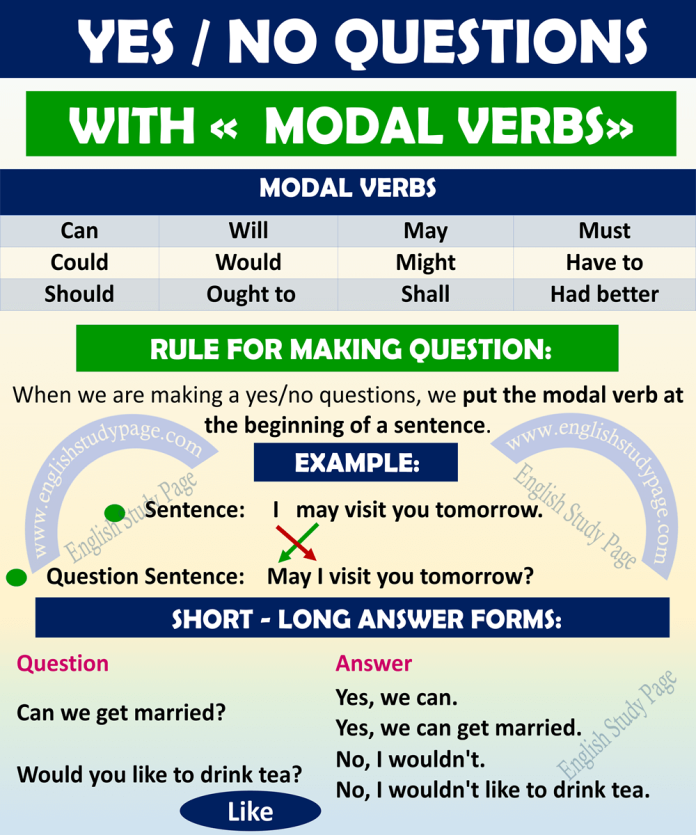[미국영어] YES NO 의문문: 1) Be/ Have 동사, 2) 일반동사, 3) 조동사
[미국영어] YES NO 의문문: 1) Be/ Have 동사, 2) 일반동사, 3) 조동사
에 대해 리뷰하려고 합니다.
영어 의문문 만드는 2가지 방법
영어에서 의문문이 되는 방법은 2가지가 있습니다.
1> YES NO 의문문
평서문 “주어+동사+~ ” 위치를 바꾸어서, “동사+주어+~” 형태로 의문문이 되는 방식입니다.
2> WH 의문문
문장 맨앞에 의문사를 사용해서, 의문문이 만드는 형태가 됩니다.
YES NO 의문문은 평서문의 주어+동사 위치를 동사+주어로 하고, 동사 위치에 Be/ Have/ Do/ 조동사가 맨 처음으로 와서 완성됩니다.
1) Be/ Have 동사
2) 일반 동사:
3) 조동사 (Modal Verbs)
![[미국영어] YES NO 의문문: 1) Be/ Have 동사, 2) 일반동사, 3) 조동사 1 YES NO 의문문](https://blog.kakaocdn.net/dn/mTPgL/btrUhiFBQC1/m7AzXbtkKR2SENW9WvlbuK/img.png)
1) Be/ Have 동사 : 형태,
“Be/ Have 동사 + 주어 + ~ ?”
Be 동사 (am, is, are, was, were, been)
Be 동사
는 주로 상태, 신분, 또는 위치를 나타내는데 사용됩니다.
Be 동사 의문문에서는 주어와 동사의 위치를 직접 바꾸는 것으로 구성됩니다.
A
m
I serious?
Yes. / Yes, you
are
. / Yes, you
are
serious.
Is
she coming?
No. / No, she
isn’t
. / No, she
isn’t
coming.
Are
they married?
Yes. / Yes, they
are
. / Yes, they
are
married.
Have 동사
Have 동사
는 소유, 경험, 또는 행동 등을 나타냅니다.
Have 동사 의문문에서는 주어와 동사를 바꾸거나, 또는 동사와 주어 사이에 도치 현상이 발생합니다.
H
ad
we sold our car?
No. / No, we
hadn’t
. / No, we had sold our car.
Had
they been married?
Yes./ Yes, they
had
. / Yes, they had been married.
Has
he lived with us?
No. / No, he
hasn’t
. / No, he hasn’t lived with us.
2) 일반동사 : 형태, “Do 조동사 + 주어 + 원형동사 + ~ ?”
일반 동사는 행동이나 상태를 나타내는 동사로, 주어와 함께 사용됩니다. 의문문에서는 주어와 동사의 위치를 바꾸면 됩니다.
일반동사 (Be/ Have 동사가 아닌 모든 동사)는
Do 조동사
를 적용해서 YES NO 의문문을 완성합니다.
Do
you prefer your tea?
Yes. / Yes, I
do
. / Yes, I prefer my tea.
Do
they always follow you?
No. / No, they
don’t
. / No, they don’t follow me.
Does
it study hard?
Yes. / Yes, it
does
. / Yes, it studies hard.
Does
she like playing piano?
No. / No, she
doesn’t
. / No, she doesn’t like playing piano.
Did
we visit our friends?
Yes./ Yes, we
did
. / Yes, we visited our friends.
Did
she take a new phone?
No. / No, she
didn’t
. / No, she didn’t take a new phone.
3) 조동사 (Modal Verbs) :
형태, “조동사 + 주어 + 원형동사 + ~ ?”
조동사 Modal Verbs
는 동사의 행동을 조건부로 나타내거나 권유, 의무, 가능성 을 나타내고, 시제를 포함하게 됩니다.
일반 동사와 마찬가지로 주어와 함께 사용되며, ”
조동사+주어+원형 동사+ ~”
의 순서로 위치를 바꾸면 됩니다.
Can
we get married?
Yes. / Yes, we
can
. / Yes, we can get married.
Would
you like to drink whisky
?
No. / No, I
wouldn’t
. / No, I wouldn’t like to drink whisky.
Might
she visit tomorrow?
Yes. / Yes, I
might
. / Yes, she might visit tomorrow.
Should
I clean my car every week?
No. / No, you
shouldn’t
. / No, you shouldn’t clean your car every week.
Will
you go out?
Yes. / Yes, I
will
. / Yes, I will go out.
Could
you introduce me about yourself?
No. / No, I
couldn’t
. / No, I couldn’t introduce you about myself.

